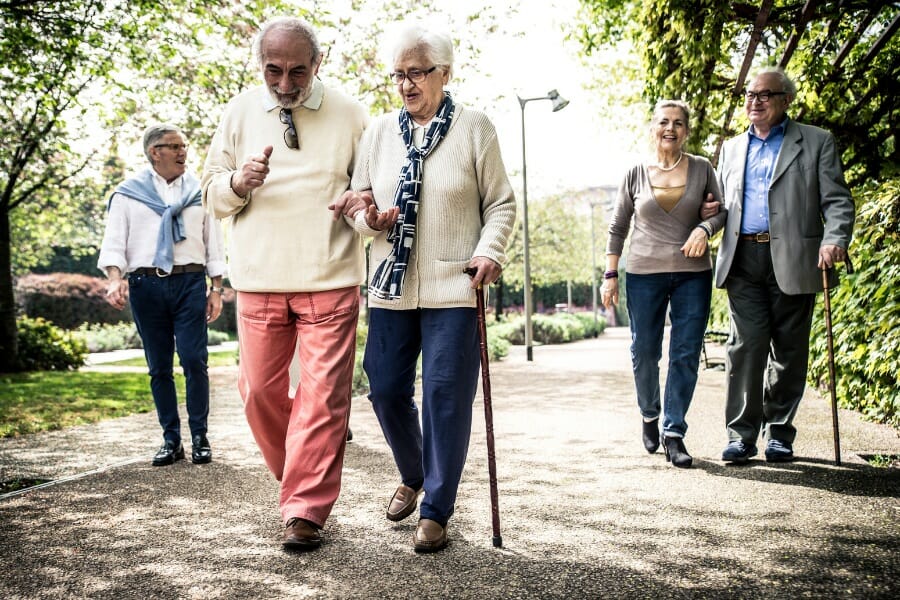Senior adults have an increased risk of facing memory issues.
As we age, our brain cells start degenerating, which is why we tend to forget important things. If you want to reduce the risk of becoming forgetful as you age, then there are specific things that you can do to keep your brain active.
What are popular signs of a loss of memory? Common signs of memory loss in a senior’s daily life include challenges in problem-solving, difficulty completing daily activities, confusion in time or place, and consistently misplacing items.
Note: It is important to treat these symptoms carefully as they can also be early signs of dementia and other memory disorders.
However, there are ways to reduce memory loss in seniors.
Mental exercise, a healthy diet, and adequate sleep are the top 3 daily activities to enhance your brainpower. Engaging in these 3 areas can help reduce the risk of losing intellectual capability or facing dementia.
Below, we’ve outlined 8 ways you can reduce the risk of memory loss associated with aging.
Key Takeaways:
The top ways that seniors can avoid cognitive impairment and improve their quality of life include:
- Economizing brain usage
- Keeping a clean home
- Using repetition
- Never stop learning
- A healthy diet
- Exercise
- Staying social
- Adequate sleep
Understanding Memory Loss in Seniors
IN THIS ARTICLE
Memory loss is a common issue among seniors. It can be a normal part of aging or a sign of a more serious condition like dementia or Alzheimer’s disease that could encourage 24-hour senior care. Understanding memory loss is crucial to reduce the risk of cognitive impairment in seniors.
Defining Memory Loss
Memory loss is the inability to remember information or events that a person should be able to recall. It can be short-term or long-term and can be caused by various factors like stress, depression, medication side effects, and sleep disorders.
Age-related memory loss is a common type of memory loss that affects many seniors. It is usually mild and does not interfere with daily activities.
Symptoms of Memory Loss
Warning signs of memory loss can vary depending on the severity and type of memory loss.
The most common symptoms of memory loss include forgetting recent events or conversations, misplacing items, and having difficulty in completing familiar tasks.
Distinguishing Age-Related Memory Loss and Dementia
Age-related memory loss is a normal part of aging and is not a sign of dementia or Alzheimer’s disease.
However, if memory loss is severe and affects daily activities, it may be a sign of a more serious condition like mild cognitive impairment or dementia.
Dementia is a group of symptoms that affects cognitive function, including memory, language, and problem-solving skills.
Alzheimer’s disease is the most common type of dementia and affects millions of seniors worldwide.
How to Prevent Memory Loss in Old Age
Economize Your Brain Usage
Most people don’t need to expend their mental energy on minor details, such as committing all of their friend’s birthdays to memory or remembering where they put their keys. There are tools to help you remember things and navigate life more easily.
As you get older, these tools become increasingly important as the risk of memory loss increases.
It will require more concentration to learn new things or remember important facts. You can use planners, calendars, shopping lists, address books, file folders, and mobile applications to store critical information, like birthdays, appointments, and medication reminders to avoid cognitive decline.
Keep the Home Free of Clutter

Ensuring the home is organized and free of clutter is one way to minimize physical distractions and enhance memory.
It is much easier to find a set of keys if there is a designated hook for them, and it is easier to find bills that need to be paid if the countertop is not full of junk.
Repeat What You Want to Remember
If you intend to keep certain information in your mind that you have recently read, thought, or heard about, then you should repeat that information over and over. Repetition reinforces the memory.
This is one of the most highly-used techniques when it comes to memorization.
It’s why children and college students use flashcards to repeat concepts and learn new things.
Never Stop Learning
Learning keeps the brain active, which reduces the risk of memory problems. People that have advanced educational degrees often enjoy enhanced mental ability in old age.
There are ways to keep the brain active beyond advanced degrees. Engaging in classes at a local community center, playing chess and online courses are all ways to keep the mind active. Nowadays, there is a plethora of online articles, videos, and courses to enjoy and learn from.
Always challenge the mind with several exercises as it will help in activating the cells of your brain and stimulate communication pathways between neurons.
Many people are engaged in jobs that allow them to stay mentally active and learn new skills. Apart from that, you can also read a book, write a story, complete a jigsaw puzzle or crossword, pursue art or music, and other types of work to keep your mind engaged.
Letting yourself sit idle isn’t necessarily a risk of dementia or other degenerative diseases, but completing challenging daily tasks and pushing your thinking skills is always beneficial.
It is essential to make learning a lifelong priority in order to preserve your mental capacity.
Eat Well

It is so important to fuel your body and brain with the proper vitamins and nutrients. A healthy, well-balanced diet can support a healthy mind. Talk with your primary care physician about your diet and whether or not a vitamin supplement could benefit you.
- Berries: Berries are rich in antioxidants, which can help protect the brain from damage caused by free radicals.
- Fish: Fish is a good source of omega-3 fatty acids, which are important for brain health.
- Beans: Beans are a good source of protein and fiber, and they also contain antioxidants that can help protect the brain.
- Olive oil: Olive oil is rich in healthy fats, which can help reduce inflammation in the brain.
Exercise the Body
Exercises—especially vigorous aerobics—can increase blood flow and improve circulation inside your brain. If you can’t engage in intense cardiovascular activities, try swimming or strength exercises.
All types of exercise can help in relieving stress and improving mood. Yoga, meditation, and walking may be easier on the body, but still provide the same brain-boosting benefits.
Stay Social

Being social, hanging out with friends, and meeting new people are all important for brain health.
We are social creatures, so naturally engaging in more social activities would have powerful benefits.
Making new friends has the added benefit or allowing you to learn new things. On the flip side, living a solitary lifestyle can have a negative impact on the brain.
It can lead to anxiety and depression, and potentially increase the risk of memory and brain health issues.
Get Adequate Sleep
Adequate sleep is essential for maintaining brain health and reducing the risk of memory loss. Seniors should strive to get 7-8 hours of sleep each night. Some tips for getting better sleep include:
- Establishing a regular sleep schedule
- Avoiding caffeine and alcohol before bedtime
- Creating a relaxing bedtime routine
Sleeping allows the brain time to clean and remove a protein called beta-amyloid plaque, which is a hallmark of Alzheimer’s disease. Losing one night of sleep can increase the risk of memory problems and dementia.
Plus, a good night’s rest helps reduce stress levels and keep our brains healthy. Always get plenty of sleep to allow your brain to rest.
These 8 tips may help you reduce the risk of memory loss. Share what you’ve learned with senior loved ones and other friends and family members to keep your and others’ brains healthy!
Fight Senior Memory Loss – Get In-Home Care Today
While there are countless tips to help seniors avoid memory loss, there are degenerative conditions such Alzheimer’s Disease and Dementia that make the situation much more difficult.
For instance, memory loss is one of the early signs of dementia.
In-home nursing care for seniors can be a helpful option for family members who would like peace of mind knowing their loved one is consistently cared for.
NurseRegistry offers professional nurses with industry-leading scheduling flexibility to ensure your loved one receives care when and where they need it. And as a private pay solution, our nurses are scheduling is never limited by insurance constraints.
Click below to begin the process of matching your elderly loved one with an empathetic and licensed nurse today.
Frequently Asked Questions
What are some common causes of memory loss in seniors?
Memory loss in seniors can be caused by a variety of factors, including age-related changes, medical conditions that lead to cognitive decline such as Alzheimer’s disease or dementia, and side effects of certain medications.
Other factors that can contribute to memory loss include poor diet, lack of exercise, stress, and sleep deprivation.
Are there any lifestyle changes that can reduce the risk of memory loss?
Yes, there are several lifestyle changes that seniors can make to reduce their risk of memory loss.
These include staying physically active, eating a healthy diet rich in fruits and vegetables, getting enough sleep, reducing stress, and staying socially engaged.
This can also have additional healthy impacts, such as weightloss, stress relief, and lower blood pressure.
What are some recommended exercises to improve memory in seniors?
Some recommended exercises to improve memory in seniors include aerobic exercise, strength training, and balance exercises.
Physical activities such as walking, swimming, and cycling can be particularly beneficial for improving memory and cognitive function.
What are some memory-boosting foods that seniors should include in their diet?
Seniors should include a variety of memory-boosting foods in their diet, such as leafy green vegetables, berries, nuts, whole grains, and fatty fish.
These foods are rich in nutrients such as omega-3 fatty acids, antioxidants, and vitamins and minerals that can help improve brain function, lower blood pressure, and reduce the risk of memory loss.
How can nurses support seniors with memory loss?
Nurses can support seniors with memory loss by providing a safe and supportive environment, helping with daily activities such as meal preparation and medication management, and engaging in activities that promote cognitive function and social engagement.
RNs and LVNs can also help seniors stay physically active, eat a healthy diet, and manage stress to reduce the risk of memory loss.






